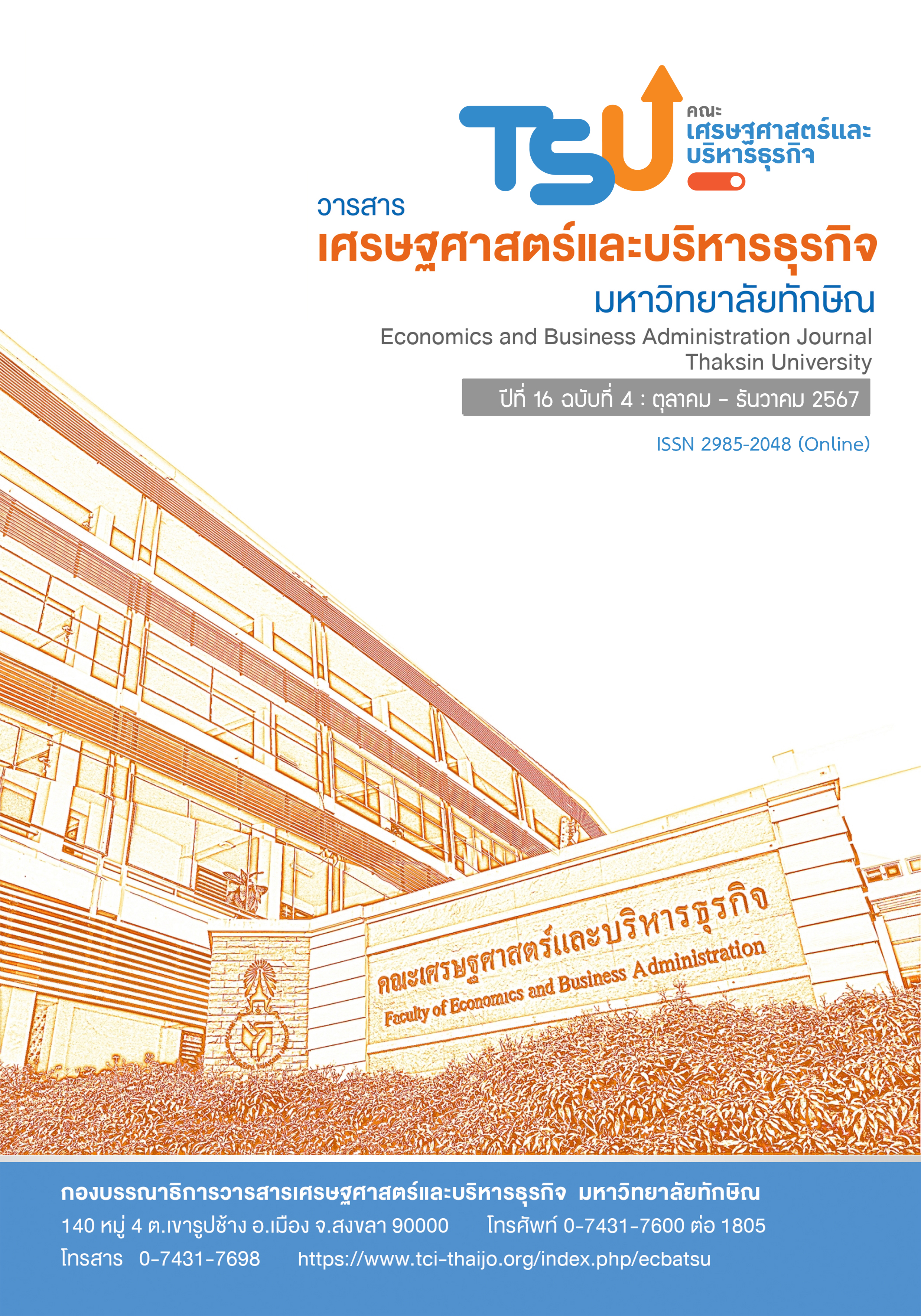An Analysis of Financial and Social Returns from Safe Agricultural Products Production, Chiang Rai Municipality, Chiang Rai Province
DOI:
https://doi.org/10.55164/ecbajournal.v16i4.267472Keywords:
Return on Investment (ROI), Social Return on Investment (SROI), Safe Agricultural ProductsAbstract
This research paper investigated the financial and social returns of producing safe agricultural products in Chiang Rai Municipality, Chiang Rai Province. The research population consisted of stakeholders involved in the production of safe agricultural products. The sample groups were selected through both specific targeted and chin sampling methods, with a total of 36 stakeholders including 23 farmers, 3 municipal officials, and 10 consumers in Chiang Rai Municipality. Data was collected through in-depth interviews in an informal conversation format, as well as participatory observation and group meetings. The instruments were assessed through content validity, and the accuracy of qualitative data was examined through triangulation techniques.
The findings of this research revealed several significant outcomes. Firstly, in terms of financial returns, the average return on investment per acre per year for farmers engaging in the production of safe agricultural products was found to have a remarkably swift payback period of 7 months. Additionally, the minimum breakeven point per acre per year was calculated to be 339.74 kilograms. Furthermore, the research highlighted a maximum rate of return on investment per acre per year of 10.09%. Moreover, the research investigated the social returns derived from the production of safe agricultural products. Notably, the findings indicated that for every 1 baht invested in the production process, there was a social return of 1.32 baht
References
Buathong, S., Srakawee, k., & Phanitjaruan, B. (2021). Social Impact Assessment and Social Return on Investment in Social Project. Bangkok: Puey Ungphakorn School of Department Studies.
Food and Drug Administration. (2021). The Ministry of Public Health ban the use of agricultural chemical to protect Thai people healthy. Retrieved May 10, 2023, from https://oryor.com/media/newsUpdate/media_news/1887
Jantasuwan, R., & Jeraeprapal, U. (2018). Preventive behavior of Chemical Substance in Fruits and Vegetables into the Body and Blood Levels of Cholinesterase in the Consumer Who Live in Khao Pra Bath Sub-District, Nakhon Si Thammarat Province. Journal of the Department of Medical Services, 43(6), 119-125.
Joungwilaikasame, W., Koonnathamdee, P., & Sap-in, R. (2021). SROI from the Movement “Agrochemicals” of Thai PBS. Journal of Journalism, 14(3), 248-284.
Kanjanawasee, K. (2016). Research and Development for Thai Education. Silpakorn Education Research Journal, 8(2), 1-18.
Luanmanee, S. (2017). Building up of Carbon Bank under Field and Renewable Energy Crops Production Areas (Research Report). Bangkok: Department of Agriculture.
Pasiphol, S. (2017). Social Return on Investment (SROI). Journal of Education Studies, 45(4), 343-353.
Pongpaiboon, N., & Phoochinda, W. (2019). Social Return on Investment of Organic Agriculture in Samparn Model Project. Silpakorn University Journal, 39(4), 137 – 254.
Promsen, W., Tamasarangkul, O., & Jaita, S. (2022). Urban Business Model Development for Safe Agricultural Products, Chiang Rai Municipality, Chiang Rai Province. Area Based Development Research Journal, 14(4), 267-282.
Rianglam, N. (2015). Financial Return, Supply Chain, and Competitiveness of White Malaga Grape Farmers in Damneon Saduak District, Ratchaburi Province. [Master Thesis, Thammasat University]. Tu Digital Collection.
Setthasakko, W., & Kanthiya, S. (2020). Social Return on Investment: A Case of Green Hotel in Thailand. Journal of Accounting Profession, 16(50), 5-22.
Strategy and Development Information Group Chiang Rai Provincial. (2022). Chiang Rai Development Strategy. Retrieved September 15, 2022, from http://123.242. 164.131/cpwp/?cat=15
Thailand Greenhouse Gas Management Organization (Public Organization). (2022). Carbon Credit Price. Retrieved May 15, 2023, from http://carbonmarket.tgo.or.th/index.php?lang=TH&mod=Y2hhcnQ=&action=bGlzdA==
Tongsiri, C. (2020). Cost-benefit Analysis Organic Vegetable Pesticide-free Insect Pesticide Usage. [Master Thesis, Thammasat University], Tu Digital Collection.
Torut, T. (2021). Cost Benefit Analysis of Organic Vegetable Production: Cas Study of Organic Farmers Network at Tha Tamnak Nakhon Chaisi, Nakhon Pathom. Academic Journal Bangkokthonburi University, 10(2), 59-71.
Uanpromma, J., Suwangbutra, P., & Upakdee, N. (2020). An Analysis of Services Utilization and Medical Care Charge in Pesticide Poisoned Patients Using the National Health Security Office Database. Ramathibodi Medical Journal, 43(2), 19-29.
Downloads
Published
How to Cite
Issue
Section
License
Copyright (c) 2024 Faculty of Economics and Business Administration, Thaksin University

This work is licensed under a Creative Commons Attribution-NonCommercial-NoDerivatives 4.0 International License.




